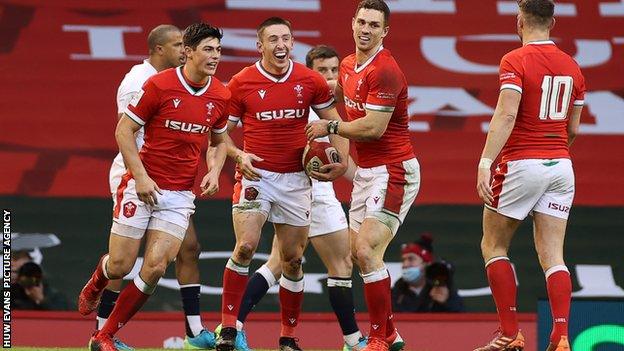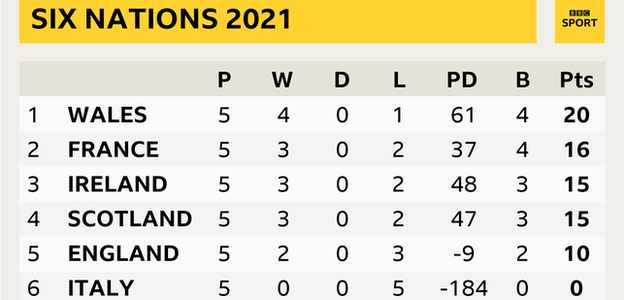Six Nations 2021: How Wales won the championship
- Published

Wales are celebrating a second Six Nations title in three tournaments
Grand Slam heartbreak, followed by Six Nations silverware. The last week has been a rollercoaster ride for Wales but Wayne Pivac's side have finally been rewarded for their efforts by being crowned champions of one of the most bizarre and exciting tournaments in history.
France could not secure the result they needed against Scotland in Paris in the finale to win a first tournament since 2010.
It completes a remarkable two months with Wales suffering devastation against France as a last-gasp defeat denied them the Six Nations clean sweep. Six days later, there is the consolation of a sixth tournament trophy since 2000.
Wales would have lifted the Six Nations trophy at the Stade de France if they had defeated Les Bleus, and followed it with wild changing room celebrations.
Instead, there will be a much more low-key presentation compared to the raucous occasions in 2005, 2008, 2012, 2013 and 2019 in Cardiff.
The accolade does represent early success during Pivac's reign as head coach, having overcome plenty of bumps in the road since taking over from fellow New Zealander Warren Gatland in November 2019.
Their results last year were poor with just three victories from 10 Tests, and those wins were against Italy (twice) and Georgia. There were lowly fifth positions in the 2020 Six Nations and Autumn Nations Cup.
Before the Six Nations they were dismissed by the bookmakers, with a top-three finish widely considered to be beyond Pivac's men as it appeared the title race would be between England and France, while Ireland looked most likely to challenge from the chasing pack.
Here is how they have proved most people wrong in a tournament played behind closed doors but full of drama.
Wales 21-16 Ireland
Six Nations 2021: Wales 21-16 Ireland - watch the highlights
It all started with a 21-16 win against 14-man Ireland, Wales taking advantage of Peter O'Mahony's 14th-minute red card.
The British and Irish Lions flanker became the first Irishman to be sent off in the Six Nations following a reckless elbow to the head of prop Tomas Francis.
Ireland bounced back to lead 13-6 at half-time through a Tadhg Beirne try and Johnny Sexton's boot.
Tries from George North and Louis Rees-Zammit along with 11 points from Leigh Halfpenny sealed success for Wales.
But that was not before late drama in Cardiff where they nearly lost it at the death.
Wales conceded a penalty which gave fly-half Billy Burns the chance to kick for the corner for a potential five metre line-out, but the replacement kicked the ball dead - much to his agony and Wales' relief.
Scotland 24-25 Wales
Highlights: Wales edge out 14-man Scotland
The extra man theme continued with Wales beating a rejuvenated Scotland team who were flying high after celebrating a first victory against England at Twickenham since 1983.
But Gregor Townsend's side could not back up their heroics at Murrayfield - like Ireland they too had a man sent off against Wales.
Tries from Darcy Graham and Stuart Hogg had the Scots 17-8 in front at half-time before a frantic seven minutes followed.
The hosts had a try disallowed and prop Zander Fagerson sent off, while the visitors went over twice to swing the momentum.
A Wyn Jones try was bookended by two from Rees-Zammit - a star born on the international stage.
His first try came moments before the break to offer the Welsh hope, while his thrilling chip and chase score would prove one of the defining moments of the tournament.
Impressive cameos from replacements Kieran Hardy, Callum Sheedy and Willis Halaholo highlighted the strength of Wales' squad.
Wales 40-24 England
Wales v England: Wales beat England 40-24 after an incident-packed match
Wales posted their highest points tally against England in a 40-24 win to clinch the Triple Crown.
Controversy also dogged that encounter with two of Wales' tries the subject of hot and ongoing debate, both given by French referee Pascal Gauzere.
Those scores from Josh Adams and Liam Williams helped Wales open a 17-14 half-time lead in Cardiff.
Adams' try was allowed after a quickly taken tap penalty kick from Dan Biggar which England captain Owen Farrell disputed as he had been talking to his side about discipline.
Williams crossed despite suggestions of a Rees-Zammit knock-on in the build-up. Hardy and Ben Youngs then swapped second-half tries as the teams went into the last 15 minutes level.
Sheedy's boot and a late try from Cory Hill moved Wales to within two games of a Grand Slam as George North celebrated his 100th Wales international with a trophy.
Italy 7-48 Wales
Six Nations 2021: Wales score seven tries to thrash Italy in Rome
The result in Rome was never in doubt as Wales hammered Italy 48-7 with the bonus point wrapped up inside 30 minutes.
Hooker Ken Owens crossed for two tries, with further scores from Adams, Taulupe Faletau, North, Sheedy and a brilliant interception effort from Rees-Zammit.
Wales matched their record of 17 Six Nations tries in one tournament with a game remaining.
This was Wales' 16th successive victory over Italy - the last defeat coming in 2007 - and also represents their longest winning run against one opponent, overtaking a run of 15 victories against France from 1908-1927.
France 32-30 Wales
Six Nations 2021: France 32-30 Wales highlights
And so to Paris. Echoes of Wales' historic 1971 Grand Slam resonated but France were to break Welsh hearts in one of the most captivating contests and epic endings in Six Nations history.
Wales held a 10-point advantage with five minutes remaining, before France claimed a dramatic last-gasp 32-30 victory with a late Brice Dulin try in the 82nd minute.
France had lock Paul Willemse sent off 11 minutes from time for making contact with the eye area of Wales prop Wyn Jones.
The visitors played the last eight minutes with 13 men following yellow cards for Faletau and Liam Williams, and ultimately could not hold out.
Wales produced arguably their most impressive performance under Pivac with fly-half Dan Biggar scoring 20 points from a try, three penalties and three conversions, while flanker Josh Navidi and wing Adams also touched down.
It had put them on the brink of a fifth Grand Slam in 16 years before the extraordinary French renaissance punished Welsh indiscipline. Wales now had to wait six days to see whether they would still be crowned Six Nations champions.
France 23-27 Scotland
Six Nations 2021: France 23-27 Scotland highlights
With Wales' five matches finished, they could only sit and wait as France hosted Scotland - who triumphed thanks to two tries from Duhan van der Merwe and despite a red card for Finn Russell.
Les Bleus would have been able to deny Wales with a bonus-point win, and with at least a 21-point margin, in the rearranged tournament finale.
It was a match that should have been played in the third round of fixtures but was postponed because of Covid-19 cases in the French camp after an infamous trip for waffles in Rome.
France had the unfair advantage of being able to still play the match and know what they had to do to win the tournament. They could not manage that as Scotland secured their first victory in Paris since 1999.
On that occasion Wales went on to defeat England at Wembley to allow Scotland to win the final Five Nations tournament. The Scots have now repaid the 22-year Welsh debt.
Worthy winners
There has been luck along the way with red cards and favourable refereeing decisions but Wales improved throughout the tournament and deserve the success.
Firm foundations have been pivotal factors in Wales' revival. There was an improved set-piece, clinical attacking which produced a record 20 tries in the tournament, and dogged defence allied to impressive discipline, at least until the last quarter in Paris.

Pivac experimented in selection during Wales' Autumn Nations Cup campaign and while results were not great, he blooded the likes of Rees-Zammit, Sheedy and James Botham at international level.
Wales unearthed a rising star of the international scene in wing Rees-Zammit, whose four tries went a long way towards helping Wales' cause.
On the other end of the scale, Wales have been boosted by the return of consistent performers like Owens, Navidi and Liam Williams.
The starting side selected was continually the most experienced team in Welsh history - with a XV of 987 caps against France.
There has been the consistent brilliance of Justin Tipuric, the rejuvenation of Faletau, the emergence of prop Wyn Jones and grizzled campaigners Alun Wyn Jones and Owens still producing the goods in their mid 30s.
Pivac also deserves enormous credit for two big calls: switching North from wing - where he'd forged a huge reputation during the vast majority of his Test career - to centre; and appointing former Wales prop Gethin Jenkins as defence coach after Byron Hayward departed.
So Pivac can claim to be emerging from the shadow of Gatland, whose 12 years in charge yielded four Six Nations titles, three Grand Slams and two World Cup semi-finals.
Watch the best tries from the 2021 Six Nations
What next?
Pivac has continually stressed everything is geared towards the 2023 World Cup in France.
It is 30 months from rugby union's global spectacular. There can be little doubt Wales are firmly on the right track, with trophies in the cabinet, confidence high and momentum established.
A scheduled summer tour of Argentina and Uruguay is next and if it goes ahead, Pivac will look to further expand his playing crop, while the British and Irish Lions' summer series against South Africa looks likely to feature a host of Wales' Six Nations winning stars.